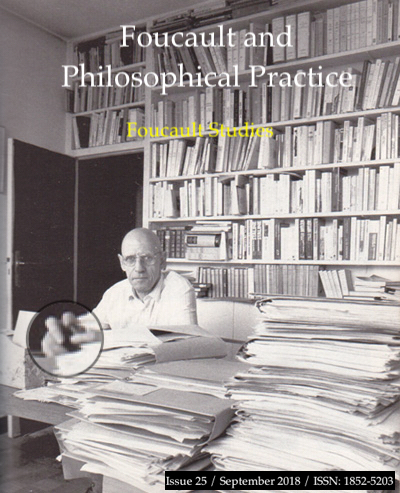Vrais Amis: Reconsidering the Philosophical Relationship Between Foucault and Deleuze
DOI :
https://doi.org/10.22439/fs.v0i25.5580Mots-clés :
Foucault, Deleuze, desire, pleasure, micropolitics, resistanceRésumé
In the current literature addressing the Foucault/Deleuze relationship, there is a clear tendency to either replicate and expand Foucault’s over-simplified rejection of Deleuzian desire as already caught in a discursive trap or play of power; or to replicate Deleuze and Guattari’s over-simplified reading of Foucault’s dispositif, in which power and resistance are deemed opposed and thus understood via a structure of negativity. In either case, each thinker is accused of referring to an asocial or essentialist multiplicity, typically in the form of a real transcendence (positive Body), which is deemed ‘inconsistent’ with their post-structuralist yearnings. This article argues that there is in fact a real and enduring consistency between the two thinkers, which is to be found in the mutual use of an ontology of ‘pure’ or ‘disjunctive’ immanence – as derived from and developed through Nietzsche’s method of genealogy – as a way to construe power/subjectification, with pleasure/desire taken as the affective inside of this power. That said, the somewhat semantic difference between desire and pleasure being proposed does lead to a slight, though tangible, divergence in politico-ethical and practical possibilities. This article concludes that it is this divergence that should from the real basis of debate.Références
Badiou, Alain, Deleuze: The Clamor of Being. London: University of Minnesota Press, 2000.
Beckman, Frida, Between Desire and Pleasure: a Deleuzian Theory of Sexuality. Edinburgh: Edinburgh University Press, 2013.
Best, Steve and Kellner, Douglas, Postmodern Theory: Critical Interrogations. Basingstoke: Palgrave Macmillan, 1991.
Beth Mader, Mary, Sleights of Reason: Norm, Bisexuality, Development. Albany: State University of New York Press, 2011.
Butler, Judith, The Psychic Life of Power: Theories in Subjection. Stanford: Stanford University Press, 1997.
Butler, Judith, Subjects of Desire: Hegelian Reflections in Twentieth-Century France. New York: Columbia University Press, [1987] 2012.
Deleuze, Gilles, Logic of Sense. London: Continuum, [1969] 2004.
Deleuze, Giles, The Fold: Leibniz and the Baroque. London: Continuum, [1988] 2006.
Deleuze, Gilles, Nietzsche and Philosophy. London: Continuum, [1962] 2006.
Deleuze, Gilles, “Desire and Pleasure” in D. Lapoujade (ed.) Two Regimes of Madness. New York: Semiotext(e), 2007.
Deleuze, Gilles and Guattari, Felix, Anti-Oedipus: Capitalism and Schizophrenia. London: Continuum, [1972] 2004.
Deleuze, Gilles and Guattari, Felix. A Thousand Plateaus: Capitalism and Schizophrenia. London: Continuum, [1980] 2004.
Dews, Peter, Logics of Disintegration: Post-Structuralist Thought and the Claims of Critical Theory. London: Verso, 2007.
Eribon, Didier, Michel Foucault. London: Faber & Faber, 1992.
Foucault, Michel, “The Confession of the Flesh” in Power/Knowledge: Selected Interviews and Other Writings 1972-1977, ed. Colin Gordon. New York: Vintage Books, 1980.
Foucault, Michel, “Truth and Power”, Power/Knowledge: Selected Interviews and Other Writings 1972-1977, ed. Colin Gordon. New York: Vintage Books, 1988.
Foucault, Michel, Discipline and Punish: The Birth of the Prison. London: Penguin, [1975] 1991.
Foucault, Michel, The Use of Pleasure: The History of Sexuality Volume 2. Trans Robert Hurley. London: Penguin, [1984] 1992.
Foucault, Michel, The Will to knowledge: The History of Sexuality: Volume One. London: Penguin, [1978] 1998.
Foucault, Michel, “Structuralism and Post-structuralism”, in Michel Foucault: Aesthetics: Essential works of Foucault 1954-1984, ed. James. D. Faubion. London: Penguin Books, 2000.
Foucault, Michel, “The Subject and Power”, in Michele Foucault: Power: Essential Works of Foucault 1954-1984, ed. James D. Faubion. London: Penguin Books, 2001.
Foucault, Michel, “Truth and Juridical Forms”, in Michele Foucault: Power: Essential Works of Foucault 1954-1984, ed. James D. Faubion. London: Penguin Books, 2001.
Foucault, Michel, The Archaeology of Knowledge. London: Penguin, [1969] 2002.
Foucault, Michel, et al. “The Gay Science,” Critical Inquiry, Vol. 37: 3, (2011), 389.
Farrell Fox, Nik, The New Sartre: Explorations in Postmodernism. London: Continuum, 2003
Freud, Sigmund, “On the Pleasure and the Reality Principle”, in The Essential Freud, ed. Ana Freud. London: Vintage, 2005, 505-517.
Grace, Wendy, “Faux Amis: Foucault and Deleuze on Sexuality and Desire”, Critical Inquiry, 36:1, 2014. DOI: 10.1086/606122
Habermas, Jürgen, The Philosophical Discourses of Modernity. Cambridge: The MIT Press, 1987
Hardt, Michael and Negri, Antonio, Empire. London: Harvard University Press, 2000.
Hendley, Steve, Reason and Relativism: A Sartrean Investigation. New York: State University of New York Press, 1991.
Holland, Eugene, “Deleuze and Psychoanalysis”, in The Cambridge Companion to Deleuze, Daniel W. Smith and Henry Somers-Hall. Cambridge: Cambridge University Press, 2012.
McCumber, John, Time and Philosophy: A History of Continental Thought. Durham: Acumen, 2011.
Miller, James, The Passion of Michel Foucault. London: Flamingo, 1994.
Nietzsche, W. Friedrich, The Will to Power. New York: Vintage Books, [1901] 1968.
Olssen, Mark, Michel Foucault: Materialism and Education. London: Paradigm, 2006.
Racevskis, Karlis, Michel Foucault, Rameau’s nephew and the question of identity, in The Final Foucault, eds. James Bernauer and David Rasmussen. Cambridge: MIT Press, 1991
Simons, Jon, Foucault & the political. London: Routledge, 1995.
Sluga, Hans, “Foucault’s Encounter with Heidegger and Nietzsche”, in The Cambridge Companion to Foucault, ed. Gary Gutting. Cambridge: Cambridge University Press, 2003.
Widder, Nathan, “Foucault and Power Revisited”, European Journal of Political Theory, 3:4, (2004), 411-432. DOI: 10.117721474885104045913
Widder, Nathan, “Two Routes from Hegel” in Radical Democracy: Politics Between Abundance and Lack, eds. L. Tønder and L. Manchester, Manchester University Press, 2005.
Wolin, Richard, The Seduction of Unreason: The Intellectual Romance with Fascism, from Nietzsche to Postmodernism. Oxford: Princeton University Press, 2004.
Žižek, Slavoj ,The Ticklish Subject: The Absent Centre of Political Ontology. London: Verso, 1999.
Žižek, Slavoj, Bodies without Organs: On Deleuze and Consequences. London: Routledge, 2012
Téléchargements
Publié-e
Comment citer
Numéro
Rubrique
Licence
Authors retain copyright to their work, but assign the right of the first publication to Foucault Studies. The work is subject to a CC BY-NC-ND 4.0 license, but despite these restrictions, authors can take for granted that Foucault Studies will permit articles published in Foucault Studies to be translated or reprinted in another format such as a book providing a full reference is made to Foucault Studies as the original place of publication.



